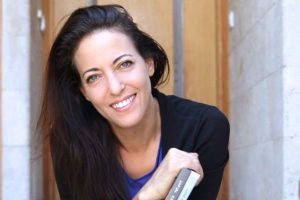
To be a modern Western woman is to confront two sides of yourself. There is the side that is ladylike and domestic, everything society deems a woman should be. The other side mocks these stereotypes and lives unburdened by traditionally female responsibilities. As modern women, we benefit from the fight of strong women before us, and can choose how to live. However, that doesn’t negate the ingrained sexism that permeates our culture. In an intimate conversation on September 20th, Lihi Lapid gave GW students a powerful look into the choices modern women face, and why it shouldn’t have to tear us apart.
As a prominent Israeli author, journalist, and photographer, Lapid is accustomed to being female in a male-dominated field. When she applied to be a photographer for the Israel Defense Forces, her interviewer told her the bag she would have to carry weighed twenty kilograms, and asked if that made her reconsider wanting the job. She said, “Do you ask the men that?” When he admitted that he did not, she replied, “So I won’t answer that question.” And that was how she became an IDF photographer.
Years later, she was a news photographer documenting the IDF response to the Rwanda crisis, covering the use of an Israeli airplane as a full-service hospital. Upon returning home shell-shocked to Israel, the short-haired, motorcycle-riding Lapid discovered she was pregnant. Her past two pregnancies ended in miscarriage, so doctors advised letting go of her career if she wanted this pregnancy to succeed. Feeling lost and alone, she began six months of bedrest.

It was during this period that Lapid found Sex and the City. While the girls worried about dumping sandal-wearing men, Lapid worried how she would turn a young couple into a family, and how she would make a small apartment into a home. The girls thought everything in life had to be perfect, and through them Lapid realized that notion was ridiculous. Family is not exact and not so easy.
In the newspaper column she has written for fourteen years, Lapid writes about balancing a career, a family, and feminism. She has much to say, considering that along with all her jobs, she also balances the fact that her daughter has autism, her son is a soldier guarding the border, and her husband is Yair Lapid, former Finance Minister and head of his own party. She has learned that compromise keeps a family together, and believes that if a soldier and an autistic girl can find common ground, anyone can.
Lapid believes there is also common ground between the two sides of a woman. While baking Hanukkah donuts one New Year’s Eve, she confronted how one side of her is the concerned mother toiling in the kitchen while her other side is the fun girl who parties with champagne. Standing there, she remembered being told in the past, “Wow, it doesn’t show on you that you’re a feminist.” A feminist doesn’t have to look or act a certain way. Feminism is about defining yourself without having to measure up against society’s expectations. She wanted both sides of herself, as they equally represented her and neither was better than the other. She recognized how revolutionary it once was for a woman to choose her direction. “I’m a feminist no matter what I choose, and anyway,” she added, “I don’t burn bras because I know how much a good one costs.”
Contributed by Noa Levin, CAMERA Fellow at George Washington University
